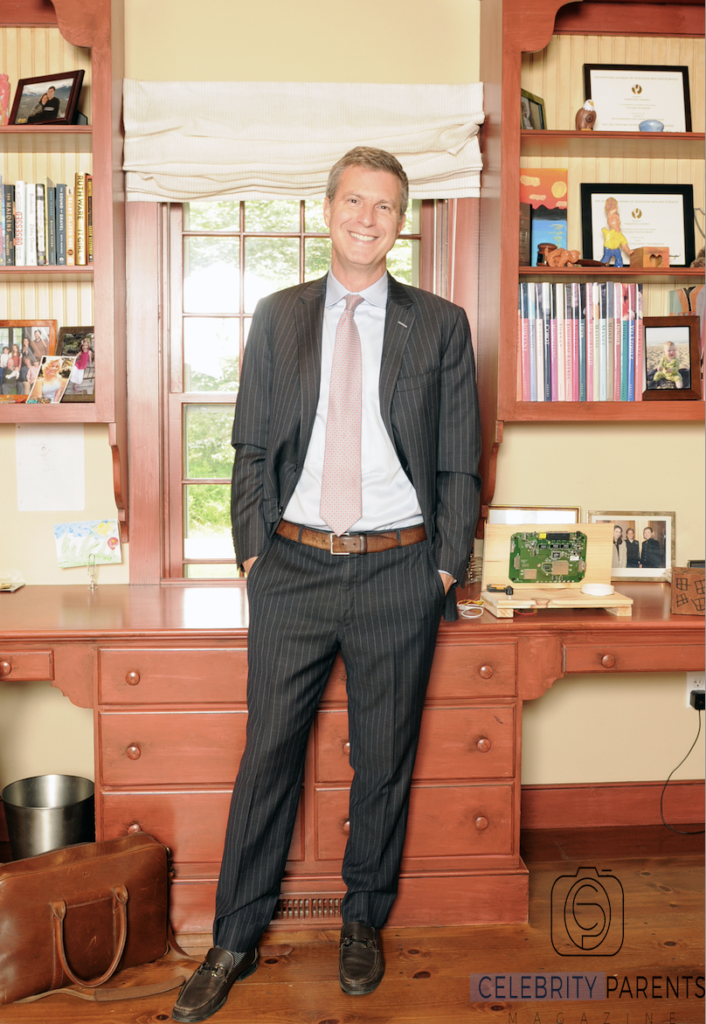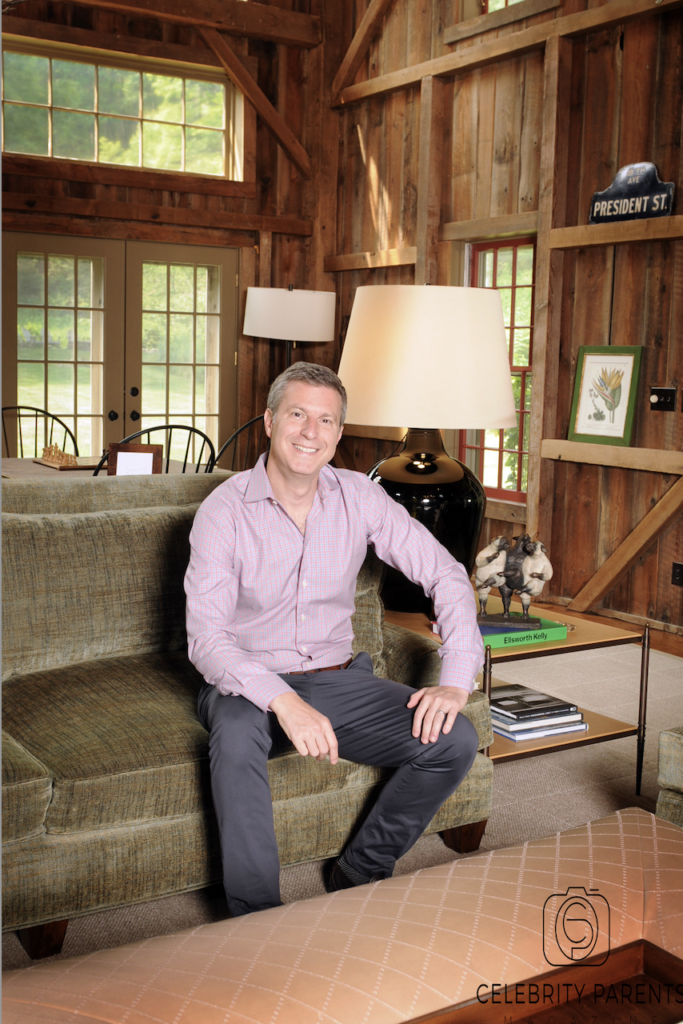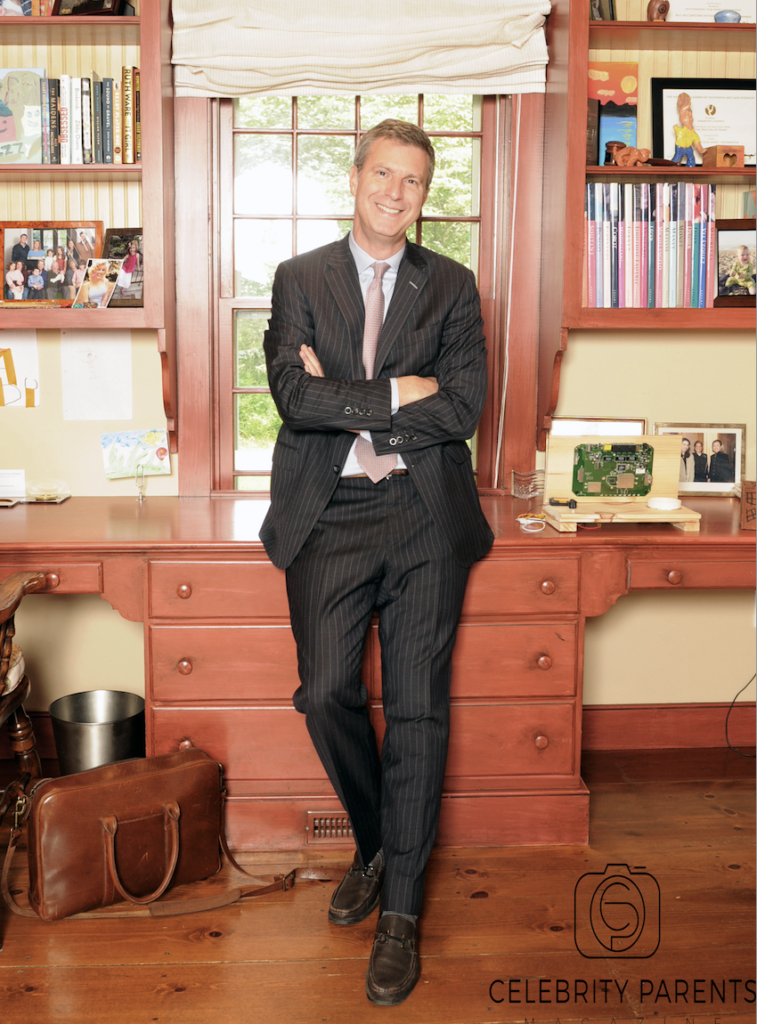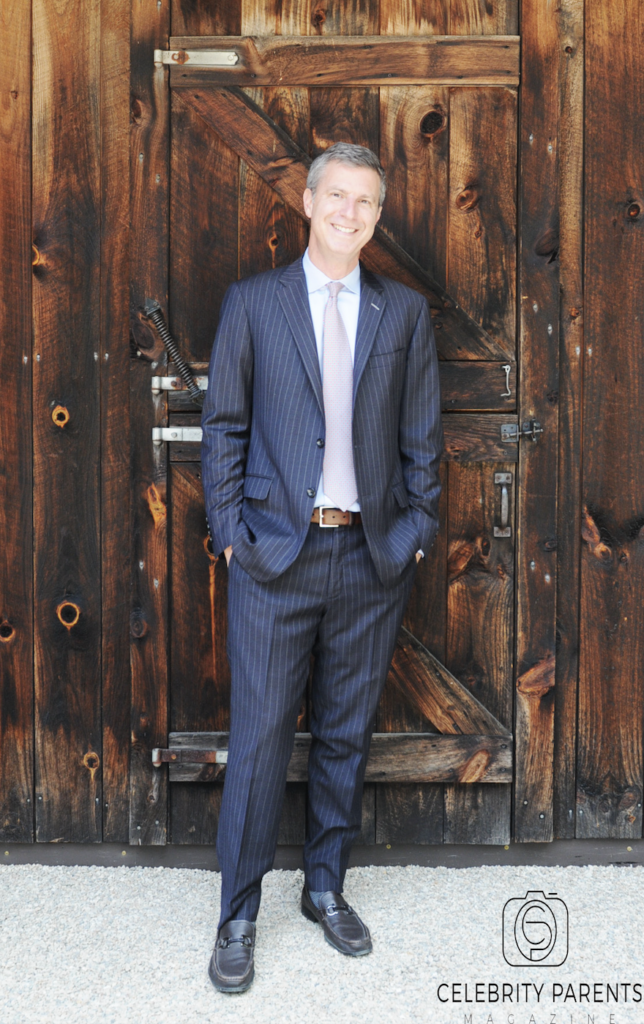Some kids watch Bluey. Others might tune into Daniel Tiger. But as a child, defense attorney Duncan Levin loved watching … Silence of the Lambs. And that makes sense, since the noted defense attorney has been crime-obsessed since he was a kid. Levin turned his love for justice into a successful career specializing in criminal law as well as anti-money laundering crimes. Perhaps unlike other attorneys, though Levin sees his clients through a different lens, one in which he sees the totality of the person (which often includes their families as well). We spoke to the dad of three about his career, his kids, and the importance of having an SSMC (Super Secret Man Cave).
Duncan, your whole life has been dedicated to the law.
Yes, it’s been pretty much over 20 years at this point. It’s all I’ve ever done and really all I’ve ever wanted to do. Ever since I was a little kid, I was fascinated with crime and I would watch a lot of true crime shows as well as read crime and detective novels. I watched Silence of the Lambs and I was obsessed with it. When I was growing up, I wanted to be the director of the FBI.
I went to law school, and I went to work at the Public Defenders Service in DC representing indigent defendants and very violent cases. It was shocking, interesting, and very motivating. When I graduated from law school, I became the Assistant District Attorney in Manhattan and prosecuted crimes and spent years there. I wound up going on to be a Federal Prosecutor for the Department of Justice. Since then, I started my own practice doing defense work. It’s really rewarding on both sides, but I really love the defense side because it’s more challenging and you get to know people, their families, and the emotional challenges.
I think as a society we like to take people and lock them away. We overincarcerate and we don’t think about what happens to people. It’s been very eye opening to be on the defense side — to see the emotional toll, not just for the defendants but the family members and the kids involved. Remember, a lot of people who are going to prison are also parents and so it has a huge impact on the children who are watching and seeing it. There’s all this ancillary damage that comes from it.
I think it’s interesting to understand how people can get to the point psychologically where they commit a crime.
We’re so fortunate to have an adversarial system of justice because in systems that are not like that, you see all these abuses. It’s not that we don’t abuses also but at least we have an opportunity to challenge the government and challenge the state on some of this stuff. There are always two sides to everything, but it doesn’t mean that people aren’t guilty. It may be that the right outcome is a more just punishment for somebody who’s facing charges. It’s my job to tell the judge and the prosecutor the full life story and to be able to temper what they’re saying with more facts that they may not be considering.
So in a way it’s like you’re a storyteller to give a fuller picture of the person you’re defending.
Every trial is a story, and every jury is there to hear all of it. I think the best storytellers are the most successful often and it’s sad to see when people have bad lawyers and are sort of railroaded by the system. There’s so much unfairness built into that. You do need to tell a story, but you need to tell one that’s gripping and truthful.
Even though you’re taking on cases that you’re passionate about, how do you not let it spill over into your personal life?
I live and breathe this work. It’s hard sometimes to separate it because everybody who I’m dealing with, in one way or another, is in a crisis. The crisis doesn’t stop at 5:00 p.m. and start again at 9:00 a.m. So in a way, it’s all encompassing but it’s given me a very unique perspective as a husband and as a parent to be able to take stock of my own life. I realize just how lucky I am to be able to have the relationships that I have along with the peace and comfort that I have. I think it allows me to be reinvigorated with my work often to be able to understand the challenges they have and to fight hard for my clients. There are a lot of jobs where you’re just on 24/7, and my clients all have my cell phone number and I encourage them to call me whenever they want. I often get phone calls at crazy hours of the day because they may have challenges that need to be answered now — getting arrested in the middle of the night or having a problem in jail, for example.
Within the criminal cases, what is your sweet spot?
I love cases that give me a big challenge, where it looks to everybody like a losing case, and I can pick it apart and win. I love to win; I’m very competitive. I like to overcome a case where everyone thinks it’s a case where there’s nothing there. I also love paper cases like financial cases where there’s a money laundering angle or an asset forfeiture angle because those cases to me are ones that are laid out on paper, but it breathes a life into those documents and maybe allows you to tell a story about what happened there which wasn’t being considered.
How many cases do you work on at one time?
I handle a pretty busy docket. I have accrued phenomenal colleagues and associates who help me manage the docket. But at the end of the day, I only take cases where I really like the client, and I have expertise in the area. I’m turning down more cases than I’m accepting, which is a privilege to be able to do but it something I take seriously because these cases can last years sometimes. I’m in the trenches with my clients; they become my friends. I see them at their most raw, so it has to be something that I want to take on that is not only important to me but that could potentially last quite a long time.
It seems like your clients become a part of your family, so to speak, so you have to be able to believe in them.
As a prosecutor, I never saw any of that. I saw people who were accused of a crime, and I saw the bureaucratic part of it but as a defense attorney, I get to know the person and their family. It’s a harder job; no doubt about it. More often, people who are charged with a crime have committed some kind of a crime — that happens more often than not, obviously. But there are cases where people are overcharged, wrongfully charged, and those cases present a unique challenge. Even in cases where someone’s committed a crime and they know they’ve gotten caught with it, there’s a lot of emotional challenge there that we need to know how to handle, manage, and ultimately get them a good result.
I love the fact that you’re considering how it impacts the person’s families as well.
Family is a very important part of this whole thing. The courts get to consider all these factors when they’re sentencing somebody, and it’s my job to not only tell the court the hard childhood somebody had or the emotional and psychological issues they may have, but also if you incarcerate this person, you’re taking away a Dad or a Mom. They might be the sole breadwinner for a family, and you need someone to provide so you need to consider all these other factors. Judges are looking at deterrents. They’re looking at ways to punish but also but there is some mitigation that we have to consider as well as society understanding the fact that we are putting people away in jail for decades for crimes where there might be alternatives that are more just and actually serve justice a lot better. We incarnate at a rate that no other civilized country in the world does. We are putting people away for non-violent drug offenses for years and years on end. That’s my job to educate the prosecutors and the judges on their stories.
Do you think being a dad of 3 helps you see clients in a new light?
I think there’s no way to do this job or many other jobs in the criminal justice system without understanding love and family. Having kids has completely changed my outlook on life. I’ve never loved as deeply as being a parent so I can see the challenges that clients who are parents are facing.
Just the other day, I was talking to a mother, a wife of a client who’s locked up and she was saying, “My daughter is asking when Daddy is coming home,” and it’s heartbreaking. I think you feel that heartbreak more as a parent. It’s a much more emotional and visceral reaction. I feel that bond and that deep love and I can advocate from my heart. I think there’s a difference between when you’re a lawyer and you’re arguing something intellectually and when you’re’ arguing something that comes from the heart. I think that a jury can see that I’m speaking about something that I care deeply about. It’s much more moving and persuasive.
This work is not about money. It’s never been about my money. Obviously, it’s very expensive to have good defense. But for me, it’s about getting a good result. I can be doing other things with my time that would be less meaningful but make more money.
I know that you’re equally passionate about your kids.
It’s my number one passion in life and I could talk about how much I love my work all day long. But my passion is my children. It’s the only and most meaningful thing to me.
When we were shooting, you were showing me the LED box that you and your son have been working on.
He’s interested in electronics and how things work. He’s been asking to unscrew all of the remote controls in our house. He even asked to unscrew our car which I thought was not a very good idea! So I started buying some junk electronics on eBay. You can buy a big box of junk electronics for $5. We take remote controls and old phones that don’t work and have been unscrewing them and seeing the motherboard. Now we’ve taken it to the next level and putting together LED nightlights and we’ve been making our own things. For me, it’s been an education in how things work inside but really it’s just been a way of spending time with him. Seeing the excitement on his face has been great. The electronics have been fun to do but it feels like we’ve spent hours just unscrewing things in the garage!
 But when you’re not unscrewing things you’ve been building a secret passageway.
But when you’re not unscrewing things you’ve been building a secret passageway.
We’ve always wanted a secret room. So in our old barn, we built a super-secret man cave, or as we call it, the SSMC. We have a little TV and some chairs in there, but the most fun part of it is that the doorway to it is an old bookshelf that we built. We didn’t have a lot of depth to work with, so we had to cut all the books in half and then glue them into the door. So it looks sort of like a bookcase to the untrained eye but I don’t think you’d be able to tell differently. When you open it, you’re in our secret room.
But really, all three of the relationships with my kids are all so deep and amazing. I love spending with them. Every night, one of my daughters and I go for a walk, what we call a night walk. We’ll buy some candy or Vitamin Water. It’s a great time and I help to put all of our kids to bed every night and I’m home for dinner most nights. I turn my computers on at night but having dinner and breakfast is time that is so vital. I do it pretty much every day.
And it’s so fleeting. Kids start developing their own interests and friends.
Don’t make me sad! But I’ve already started thinking about it because my oldest is 14 and college is far away but not that far away. These are the most rewarding relationships. Your job as a parent is to push them out the door and make them come back as often as possible! That’s going to bring me a lot of joy, too, to see them functioning as adults who are kind, smart, and have intellectual passion for the world, and also want to go to new places and learn new things. I want them to love their childhood and also be ready to fly out the door.
It’s important to be a part of their interests.
It’s not always what you’re interested in. it’s important to enjoy it and live through their eyes as well. I think the worst thing is to try to make them do what you’re interested in them doing. You want them to be their own people and flourish in that way. I would never sit around on my own unscrewing junk electronics, but it’s turned into such a fun project because you see the excitement in his eyes. Living your life through the eyes of your children is such a joyous thing.
 Are any of the three kids showing any inclination for law?
Are any of the three kids showing any inclination for law?
Not at all. It’s so funny; all I want is for them to be happy and have meaningful lives. I couldn’t care less if they become artists or nurses, doctors or lawyers, or just want to travel the world as nomads. I just want them to be happy and I think that they’re fortunate to have childhoods where they can explore all those things. I haven’t put that on them, and I don’t think they really know much about what I do for a living. They might know a little bit but they’re still young so they shouldn’t even know what they’re going to do yet. My son talks about becoming a NASA engineer or my daughter talks about becoming an actress and this is all great. When you’re a kid, you should explore all of those things. I’ll support them in whatever they want to do, but I don’t know if we need any more lawyers!






